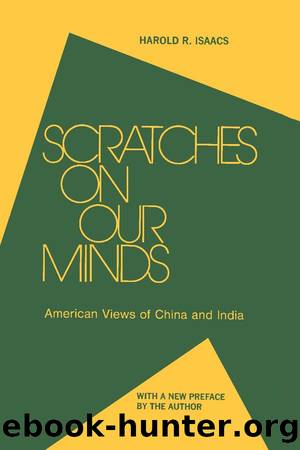Scratches on Our Minds by Harold R. Isaacs

Author:Harold R. Isaacs
Language: eng
Format: epub
ISBN: 9781317460060
Publisher: Taylor and Francis
The Nearly Total Severance
This dislocation was first of all purely physical. There was no place in the Communistsâ China for the American as purveyor of the goods of a superior civilization, as soul-saver, teacher, mentor, guardian, protector, nor even as scholar, journalist, or merely curious onlooker. The initial pell-mell exodus, the imprisonment of stragglers, the swift liquidation of American enterprises, the military collision in Korea, and the subsequent stalemated hostility, all made the mutual sealing-off process nearly complete. In mid-1957 there were, as far as was definitely known, 23 Americans all told in all of China, compared to 13,300 American residents in 1937, the last âpeacetimeâ year.125 Thus, within only a few years after Congress had finally repealed the sixty-year-old laws excluding Chinese as immigrants from the United States, the turn of events created a situation which sweepingly excluded Americans of every description from China.
This exclusion, to compound the irony, was discriminatory: it applied to Americans only. Communist China became, after its first few years, a veritable mecca for visiting delegations and individuals from many other countries. Many who cameâthough not allâtended to be sympathetic votaries of the regime, come to marvel or to gain by the contact, or invited guests on whom the Communists hoped to make a decisive impression. From among these travelers, writers of several nationalities soon produced a small mountain of literature on their observations in China. Most of it was highly partisan and very little of it reached American readers. Among books reflecting firsthand experience by non-Americans, we had two accounts by disillusioned young Chinese (Liu Shao-tang, Out of Red China, 1953, and Maria Yen, The Umbrella Garden, 1954); two by Indian visitors (Frank Moraesâ Report on Maoâs China and G. P. Hutheesingâs The Great Peace, both in 1953) who were a good deal less uncritically admiring of the Chinese Communists than most of their touring countrymen; and several accounts by Englishmen (e.g., the reportorial No Flies in China by George S. Gale and James Cameronâs Mandarin Red, both in 1955, and the more partisanly sympathetic Daybreak in China by Basil Davidson in 1953); and, in 1957, Robert Guillainâs deeply worried 600 Million Chinese. These all appeared in American editions, but none had any wide sale. The New York Times occasionally printed Peking dispatches from Reuterâs, the British news agency. Even more occasionally, a series of articles by some English or Australian correspondent or noted traveler (like Clement Attlee) was syndicated to American newspapers. Such, almost in sum, was the writing at firsthand about China by non-Americans which reached any American readers.
Writing by Americans about China, such a massive flow only a few years before, had meanwhile dried to the merest trickle. After the initial accounts of the Communist takeover, written by Americans still there at the time, there were a few later books by missionaries and others who brought up the rear of the general exodus,126 one plainly pro-Communist account,127 and occasional articles based on the experience of soldiers and prisoners in Korea or of repatriates who came blinking across the Hong Kong barrier at wide intervals.
Download
This site does not store any files on its server. We only index and link to content provided by other sites. Please contact the content providers to delete copyright contents if any and email us, we'll remove relevant links or contents immediately.
| Africa | Americas |
| Arctic & Antarctica | Asia |
| Australia & Oceania | Europe |
| Middle East | Russia |
| United States | World |
| Ancient Civilizations | Military |
| Historical Study & Educational Resources |
The Dawn of Everything by David Graeber & David Wengrow(1707)
The Bomber Mafia by Malcolm Gladwell(1622)
Facing the Mountain by Daniel James Brown(1553)
Submerged Prehistory by Benjamin Jonathan; & Clive Bonsall & Catriona Pickard & Anders Fischer(1455)
Wandering in Strange Lands by Morgan Jerkins(1430)
Tip Top by Bill James(1416)
Driving While Brown: Sheriff Joe Arpaio Versus the Latino Resistance by Terry Greene Sterling & Jude Joffe-Block(1376)
Red Roulette : An Insider's Story of Wealth, Power, Corruption, and Vengeance in Today's China (9781982156176) by Shum Desmond(1359)
Evil Geniuses: The Unmaking of America: A Recent History by Kurt Andersen(1353)
The Way of Fire and Ice: The Living Tradition of Norse Paganism by Ryan Smith(1336)
American Kompromat by Craig Unger(1315)
F*cking History by The Captain(1304)
It Was All a Lie by Stuart Stevens;(1300)
American Dreams by Unknown(1286)
Treasure Islands: Tax Havens and the Men who Stole the World by Nicholas Shaxson(1273)
Evil Geniuses by Kurt Andersen(1257)
White House Inc. by Dan Alexander(1212)
The First Conspiracy by Brad Meltzer & Josh Mensch(1174)
The Fifteen Biggest Lies about the Economy: And Everything Else the Right Doesn't Want You to Know about Taxes, Jobs, and Corporate America by Joshua Holland(1126)
